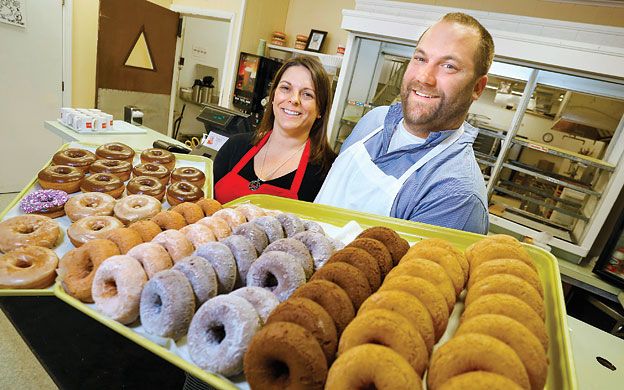How an economic development corp. helped an iconic doughnut shop grow into a Maine brand
Shelby and Nels Omdal had lofty ambitions when they bought Frosty's Donuts on a “hope and a prayer” in 2011. After cobbling together a $5,000 deposit at the last minute and putting their house on the line to complete the deal, the couple knew the nearly 50-year-old Brunswick-based doughnut shop — considered an institution by many locals — had potential to grow beyond town borders, and into a Maine brand. They just didn't think it would happen so fast.
In less than three years under new ownership, Frosty's has expanded to four retail locations and developed a growing wholesale business with 23 accounts that span from Scarborough to Waldoboro. One of those wholesale accounts alone places dozens of fresh doughnuts at 11 Hannaford supermarkets, Shelby Omdal says, and that store count is expected to nearly double by year's end.
“For the little Brunswick doughnut shop, it's pretty amazing,” Shelby Omdal tells Mainebiz, speaking from the company's new production headquarters at Brunswick Landing, where it expects to hire seven more full-time employees this summer, bringing its total work force to 30.
Frosty's wholesale account with Hannaford is by far the company's most significant, producing nearly 2,000 doughnuts a day for stores in the greater Portland area, Boothbay Harbor, Waldoboro and Damariscotta — which represents approximately a third of its daily production volume. For Hannaford alone, Frosty's is expecting to nearly double its production after signing a new contract in May for up to 10 additional stores, which means the doughnuts will be sold in more than a third of the supermarket's 57 Maine-based stores by year's end.
Like many small business owners in Maine, the Omdals relied on funding from family members and their own pockets to help reopen Frosty's, which had temporarily closed after the death of June Frost, one of the co-founders. A key part of Frosty's growth has been alternative sources of funding — funding that's available to many qualified small businesses.
Shelby Omdal, who previously worked in real estate, says it's still hard to convince most banks that a retail-and-wholesale doughnut business would be a worthwhile investment. So when Shelby and Nels Omdal heard that a quasi-municipal organization called the Brunswick Development Corp. was lending to local businesses looking to create and retain jobs within town, they quickly jumped on the opportunity.
Alternative funding
The Brunswick Development Corp., founded in 1995, was created with the purpose of encouraging economic development by providing incentives to businesses looking to grow or move within town borders. Enabled by state statute, economic development corporations are one of the many tools a municipality can use to encourage local business growth, but they can come in many different shapes and sizes across the state.
Organizations like BDC differ from regional economic development corporations like Aroostook County's Northern Maine Development Commission and others, which coordinate planning efforts between multiple communities. Instead, the ones formed by individual towns and cities typically have a more defined focus.
Linda Smith, Brunswick's business development manager, serves as the staff liaison for the BDC. She says local economic development corporations can help communities focus on developing its assets and resources in a “more intimate way” than larger bodies. And for businesses that pose too much of a risk for banks, economic development corporations can help provide crucial, early-stage financing.
“It's an opportunity when you've got a business that's trying to grow that may just not exactly fit some of the bank's parameters or may just try to do something with a little more risk,” she says. When economic development corporations are willing to fulfill a funding proposal, “they're saying this could make a big difference in this community ... I think that's the big deal.”
While some communities, like Brunswick, have had their own economic development corporations for decades now, others are just starting to test the waters. The city of Ellsworth, for instance, launched its economic development corporation last year. It has various initiatives in stages of planning, including the development of a business loan fund and a collaboration with The Jackson Laboratory to develop a business incubator program.
Micki Sumpter, the city's economic development director, says economic development corporations can be beneficial to municipalities in a variety of ways — for instance, by offering a board with citizen members who represent a wide array of expertise and industries.
“Private industry and the municipality can work together to bring this about,” Sumpter says. “When you have a partnership like that, you can make a lot more happen, then the whole community knows what's going on.”
The other benefit, Sumpter says, is the nonprofit status that comes with economic development corporations. She says that means the community may have access to more funding opportunities that otherwise wouldn't be available to a municipality. “Some funding sources won't fund a municipality,” she says, “but they will fund this.”
Growing communities
When Frosty's Donuts was approved for a $137,500 loan from the BDC last November, it was a landmark deal that allowed the company to move its wholesale business forward with Hannaford. The loan helped Frosty's renovate the kitchen at its 54 Maine St. location, purchase a delivery vehicle and switch to natural gas, which is expected to save hundreds of dollars annually. The loan also included a job-creation component.
To encourage Frosty's to create and retain new jobs, the BDC agreed to forgive half of the loan if Frosty's creates five new full-time jobs within 12 months of receiving the funds, but only if those positions are retained for the next five years. Those workers must put in 30 hours a week.
For the Omdals, that has proven to be an easy task so far. Within just three months, Frosty's has added not five, but 11 full-time employees to meet the new demand from the Hannaford stores, which it has been supplying since the end of last year. “That's what it took to make it all work,” Shelby Omdal says. “[The BDC's board members] were thrilled because that was their purpose, which is to get more people employed in Brunswick.”
Even now, she says Frosty's has found difficulty convincing banks that it is a worthy loan candidate. Shelby Omdal says she can't imagine how Frosty's could have moved forward without the BDC loan.
“The insane part was we were about to embark on this Hannaford thing on our own,” Shelby says. “It would have been bad, it would have been really bad, because without that financial support — that's what made that happen for us.”
With a growing wholesale business and a plan to open a new retail store in Gardiner (see Page 26 to learn about Gardiner's downtown initiative), Frosty's projects gross sales of $1.1 million for the year, a big jump from $461,000 in 2012 and $766,000 in 2013, Shelby Omdal says. She adds that Frosty's has been profitable for its first two years under new ownership, and projections point to another profitable year in 2014.
Now that Frosty's has opened its new Brunswick Landing headquarters, the Omdals are hoping to receive a $160,050 grant from the state's Community Development Block Grant Program to renovate and outfit the production facility to be ready for its expanded wholesale-account business this summer. With an application that was expected to be filed by the Brunswick Town Council in late May, the funding announcement is expected to come by late June.
“We're a Maine business, started from nothing to here and we've done that only with help of the community and the state and the support that we've received,” Shelby says. “So it really doesn't feel like our success in any way shape or form — we're just working it. We want people to feel proud that Frosty's is from and made here, and that's where our branding is going at this point.”
A change in direction
The $137,500 loan to Frosty's was the last of its kind, in part because the BDC had given a majority of its money through loans and grants last year, leaving the organization's board with a small nest of funds for 2014. That reality became immediately apparent at a meeting earlier this year when BDC's board of directors was faced with a barrage of funding requests that was nearly double the $380,000 it had in cash.
“We had to take a step back and see how we can maximize the assets and still have an impact and benefit to businesses in the community,” Larissa Darcy, president of the BDC's board, tells Mainebiz from Frosty's Maine Street location in Brunswick. That's why, she says, after a change in membership with the board's two Town Council members and two of its four citizen members, the board decided to change its lending policy.
From now on, the BDC will only issue small grants to nonprofits. As for for-profit businesses, the BDC will no longer give larger loans that can have part of it forgiven. Instead, a subcommittee that includes Linda Smith, the organization's staff liaison, is exploring the possibility of giving out smaller loans in conjunction with financial institutions or regional economic development corporations that may have more resources to assess proposals.
Though the future of BDC's efforts may look very different than its past, the organization has undoubtedly made its mark in growing local businesses. And not just Frosty's.
The economic development corporation also had a hand in lending to retail franchise Cool As A Moose as it relocated its headquarters to Brunswick, and giving a grant to aid the Midcoast Regional Redevelopment Corporation with development of its TechPlace business incubator. In addition, the BDC helped Gelato Fiasco open its wholesale production company in town with a loan after the company had been eyeing locations in Portland and Topsham.
Looking back at all the work the BDC has done, Darcy says Brunswick wouldn't be the same without its funding, adding that's why it's important for communities to be proactive when attracting new businesses and providing assistance to existing ones.
“If you look at a community that doesn't have a vibrant downtown, that can happen if you're not active. These things don't happen by themselves,” Darcy says. “You have to have people who are involved in economic development and supporting the community, so that you can have a vibrant town and have a place that people love to come to.”












Comments